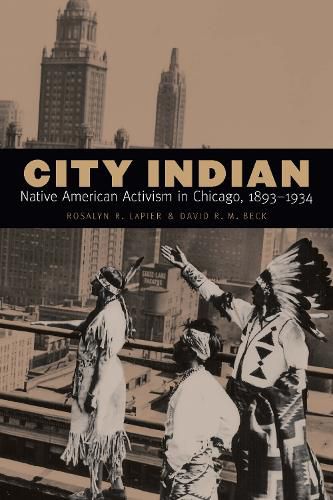Readings Newsletter
Become a Readings Member to make your shopping experience even easier.
Sign in or sign up for free!
You’re not far away from qualifying for FREE standard shipping within Australia
You’ve qualified for FREE standard shipping within Australia
The cart is loading…






Robert G. Athearn Award from the Western History Association
In City Indian Rosalyn R. LaPier and David R. M. Beck tell the engaging story of American Indians who migrated to Chicago from across America to work and emerged as activists. From the 1893 World’s Columbian Exposition to the 1934 Century of Progress Fair, American Indians in Chicago voiced their opinions about political, social, educational, and racial issues. City Indian focuses on the privileged members of the American Indian community in Chicago: doctors, nurses, business owners, teachers, and entertainers. During the Progressive Era more than any other time in the city’s history, they could be found in the company of politicians and society leaders, at Chicago’s major cultural venues and events, and in the press, speaking out. When Mayor Big Bill Thompson declared that Chicago public schools teach America First, American Indian leaders publicly challenged him to include the true story of First Americans.
As they struggled to reshape nostalgic perceptions of American Indians, these men and women developed new associations and organizations to help each other and to ultimately create a new place to call home in a modern American city.
$9.00 standard shipping within Australia
FREE standard shipping within Australia for orders over $100.00
Express & International shipping calculated at checkout
Robert G. Athearn Award from the Western History Association
In City Indian Rosalyn R. LaPier and David R. M. Beck tell the engaging story of American Indians who migrated to Chicago from across America to work and emerged as activists. From the 1893 World’s Columbian Exposition to the 1934 Century of Progress Fair, American Indians in Chicago voiced their opinions about political, social, educational, and racial issues. City Indian focuses on the privileged members of the American Indian community in Chicago: doctors, nurses, business owners, teachers, and entertainers. During the Progressive Era more than any other time in the city’s history, they could be found in the company of politicians and society leaders, at Chicago’s major cultural venues and events, and in the press, speaking out. When Mayor Big Bill Thompson declared that Chicago public schools teach America First, American Indian leaders publicly challenged him to include the true story of First Americans.
As they struggled to reshape nostalgic perceptions of American Indians, these men and women developed new associations and organizations to help each other and to ultimately create a new place to call home in a modern American city.